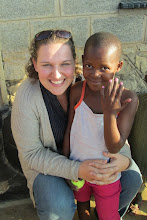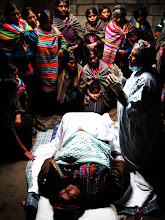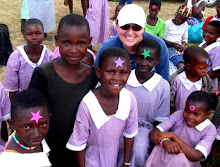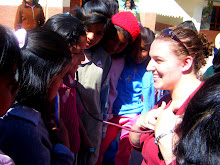As an academic and anthropologist, I was never really intrigued by HIV/AIDS, as a physiological disease, cultural experience, or epidemic. It sounds callous and elitist in retrospect, to knowingly decide to be uninterested in a disease that affects the lives of millions, but that's the honest truth. We'd come to HIV in my "Anthropology of Disease" course in graduate school, and I'd let out an exasperated sigh and think, "Here we go again." It just seemed over-studied, and over- analyzed. "There are so many forms of suffering that go completely unnoticed," I told myself, "and HIV already has more than it's fair share of advocates screaming for attention. Let someone else worry about it." And then I moved to Lesotho...
It's easy to ignore the magnitude of a disease like HIV/AIDS, when you can reduce it to a collection of shiny graphs or bullet points on a power-point slide. It is a whole other thing to have it stare back at you in the middle of your Math Class in the form of an orphaned 17 year old, or a 14 year old, who's literally wasting away to skin and bones in front of your eyes. And with one of the highest per-population HIV infection rates in the world, that's exactly what I stand up and face in my high school classes every single day. This is my new reality... And the face of HIV is a grim one.
Last week, Lesotho's Ministry of Education sent out a survey of students that each school in the country had to complete. Linokong High School was no exception, and as the class teacher (essentially the "home room" teacher) for Form D (11th grade), I was asked to complete the survey for the students in my class. There were a range of questions, asking about students' ages (it's worth noting that I am younger than some of my students), how many students were "repeaters," and about their families. Yet despite all the ways that HIV has already crept into my life here in Lesotho, I was still surprised when I reached the end of the survey and there were two pages of questions asking about the number of orphans in my class. "Okay," I thought, "This is fine... I always knew there were orphans in my classes. It's bound to only be a few." I went in to complete the survey with my students, prepared to face the chilling reality of HIV... Or so I thought.
There are 49 students (and counting, as the number seems to rise daily!) in my Form D class. When I asked everyone who had lost only their mothers (their fathers are still living) to stand up, I nearly lost my breath for a moment. No less than 12 students timidly came to their feet. I was stunned. My class, previously full of laughter and whispers as students had announced their ages, was now grimly silent. Eyes were downcast; embarassed to acknowledge the obvious truth. I recollected myself and moved on, "Stand if you have lost your father, but your mother is still living" I announced. Another 8 students came to their feet. I nearly groaned with dread, as I read out the final question... "Stand if neither of your parents are living." Six more students/orphans shyly admitted defeat and rose to their feet... Including the quiet little boy that sits near the front of my class. He is undeniably smart, but his tattered school uniform tells the story of a much harder reality at home. Suddenly, he made a little more sense to me.
All in all, over half of the students in my class have lost a parent or both. It's a jarring reality to witness. These kids go home to houses where a key figure in their lives is notably absent. They have known true loss at such young ages... And here in Lesotho, to loose a parent seems more common than to have both still living. I do not know how these students lost their parents. There are obviously multiple common causes of death in Lesotho. But none so common, for this age group (adults in their prime), as HIV/AIDS. It is literally ravishing the adult population of Lesotho. And it's effects are everywhere.
Over the last two weeks, I have been lucky enough to get to know one of my Form E (12th grade) students, Thato (or Naomi), well. Thato first approached me several weeks ago for extra help preparing for her COSC Math exam (she, like many students here, struggles in Math)... And her exemplary English skills, quickly allowed us to become friends. She wants to be a nurse, and her determination is absolutely admirable.
You see, this is not Thato's first attempt at the COSC exam. She sat for it, and failed her Math exam two years ago. After a slew of rejections for the very limited and coveted slots at one of Lesotho's universities, she returned to high school to retake her entire Form E year. She lives in "upper Ha Selomo," my "sister" village just over the mountain from my house, with her little brother, Boitumelo (one of my Form A students) and her elderly grandfather.
Every morning, Thato wakes at 4am to get ready for the day, get Boitumelo up, and make the hour long walk across the mountain to school (And her commute is not even close to the longest that some of my students make). Students are required to be at school by 7am for study; Thato is there every morning at 6am. "Its too noisy when the other students are there," she tells me. "I have to work hard if I want to become a nurse." When school ends at 3:45pm, she and Boitumelo walk over the mountain again, and she starts the household chores of cooking and cleaning- A woman's work, and her home is noticeably absent of any maternal figures to help her.
She showed me her and Boitumelo's few priceless family photos, when I visited her home this past weekend... Pictures of her mother, father, grandmother, and aunts filled the pages. They aren't here anymore to fill her grandfather's house with their support, help, and guidance though. She and Boitumelo are all that's left of the full and happy family that is memorialized in that tattered old photo album. And yet, they are both so smart with bright futures ahead of them. They are making wise choices in the face of overwhelming odds, and they are the perfect example of what "hope" looks like in my rural corner of Butha-Buthe, Lesotho.
I'd be remiss if I were to only illuminate the tragedy of stories, like Thato's... Because her story is so much more than that. For me, she is a shining example that, in the midst of so much loss, people still rise to the overwhelming challenges presented by the HIV/AIDS epidemic in this country. Take my colleague and friend, Chris Morake, for example. Every month, Chris, a married, busy, full-time high school teacher and English Club coach, takes his natural rapport and easy confidence with kids, out of the classroom and into the hospital. There, he leads a monthly support group for orphans and children with HIV. In the midst of games, jokes, and his now famous outbreaks into "song and dance," (which he constantly graces us with in the staffroom at my school- Seriously, the man has got rhythmn! Ha!) he provides these victims of HIV/AIDS with a safe place to express their sadness, shame, and anger. You see, HIV in Lesotho is still very much stigmatized, despite it's obvious prevalence. To other Basotho, these kids are walking time-bombs... Lepers who are liable to infect anyone they touch. To Chris, they are just kids. Kids who have been given a heavy burden at an incredibly young age. His willingness to give these youth a "safe haven" and role model, is beyond inspirational. This is what fighting HIV/AIDS really looks like... Real people, making little steps in the right direction, and changing one life at a time.
I'm learning a LOT more about what this disease really means sitting right here at Linokong High School, than I ever did in a classroom at University. It's a hard lesson, but one full of patience, strength, and undeniable hope.
With Love from Lesotho... Mary E.
Subscribe to:
Post Comments (Atom)






No comments:
Post a Comment